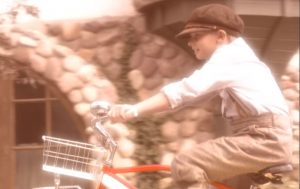Show Notes for Episode 5 of Teach Me to Walk in the Light Podcast. Learn how hard work is not only a commandment from God but also a blessing both temporally and spiritually. Hear stories of successful people and the hard work it took in order for them to succeed. Also, learn how discipline can be used to teach gospel principles.

Sign up to receive weekly FHE Outlines delivered right to your inbox! Making FHE preparation as easy as possible for you!
PERSONAL STUDY
There’s a quote by Pres. Monson that says, “It is not enough to want to make the effort…It’s in the doing, not just the thinking, that we accomplish our goals.”
Hopefully so far this year, you are totally killing it when it comes to accomplishing your New Year’s goal. Perhaps you’re starting to realize that like what Pres. Monson said, it’s not enough to WANT to make the effort, it’s in the actually DOING that we accomplish our goals. If you’ve started on your new goal, you are probably realizing how much work really does go into achieving that goal.
In a talk entitled The Blessing of Work By Bishop H. David Burton he said:
“Today, many have forgotten the value of work. Some falsely believe that the highest goal in life is to achieve a condition in which one no longer needs to work. President David O. McKay (1873–1970) was fond of saying, “Let us realize that the privilege to work is a gift, that power to work is a blessing, that love of work is success.”
Work is not just so we can earn a paycheck, we have been taught in the scriptures and by modern-day revelation that it is a spiritual necessity. AND it’s what you have to do to reach any goal. Heavenly Father’s goal is to bring to pass the immortality and eternal life of man but it’s also His WORK.
Heavenly Father has commanded us to work since Adam and Eve when He instructed them to dress the Garden of Eden (Gen. 2:15) and it was reemphasized later when they were driven out and the ground was cursed “for thy sake.”
Pres. David O McKay once said, “God has blessed us with the privilege of working. When he said, ‘Earn thy bread by the sweat of thy brow,’ he gave [us] a blessing. Men and women have so accepted it. Too much leisure is dangerous. Work is a divine gift.”
Even in the 10 Commandments, we are instructed, “Six days shalt thou labour” (Ex. 20:9).
Today I want to share with you a few examples of hard-working people and what they had to say about hard work.
First one is…let’s see if you can guess after listening to this…
[A part of Prelude in Minor E by Bach is played]
If you guessed Johann Sebastian Bach the world-famous composer, then you are correct.
An interesting fact about him is that although he is perhaps one of the greatest composers of all time, Bach was known during his lifetime primarily as an outstanding organ player.
In his lifetime he wrote 1128 compositions – not counting 23 that were lost or unfinished. Remember all of these compositions were written by hand and some of his compositions are very long – there’s one that is almost 3 hours.
Bach had to be very fast. It is estimated that if he started composing by the age of 15 and he died at the age of 65, then he wrote 22.56 compositions per year or took 16 days of composing for each one. That is extremely fast and a LOT of hard work.
Speaking of his great talent Bach said:
“I had to work hard. Anyone who works as hard will get just as far.”
Or there’s an example given of hard work by David E. Sorensen in a BYU speech. I love his point of view. He said:
“Every job has its challenges and its days of drudgery…Let me give you an example. Michelangelo, the virtuoso painter and sculptor, shared this profound insight about his work. He said, “If people knew how hard I had to work to gain my mastery, it would not seem so wonderful at all.” Some of you may have seen firsthand Michelangelo’s brilliant work. But how many of us have stopped to think of the literally backbreaking, tedious job of chiseling the statue of David out of a single slab of solid marble! And to create a 14-foot statue of David! And certainly David was not Michelangelo’s first sculpture. Undoubtedly he struggled and labored with hundreds and thousands of sculptures before achieving that masterpiece. Wouldn’t it be tragic if Michelangelo had decided after his first few grueling years of sculpting marble that it was just too hard, too tedious, and too boring—that he’d much rather be a writer? The irony is, had he made that change, he would have likely discovered that writing can be tedious and boring too! You will find more success if you enthusiastically persist in your work despite the shortcomings of your job and despite the daily small and simple things.”
How often do we quit because we find things hard or boring? I have, sadly, several times. I think the lesson many of us need to learn AND teach our kids is the lesson of not giving up and to keep working even when it seems hard or boring.
Now let me share with you a story about a man who, because his hard work as a boy, realized if he hadn’t worked as hard as he did then, his life would have turned out very different.
This story is by Elder Uchtdorf – I’ll let you hear the story from him:
Click HERE
Hard work is a blessing both temporally and spiritually. Don’t let Satan discourage you. Do not doubt the efforts you are making – even if they seem small at the time. Keep doing your best, keep moving forward, don’t give up – just keep at it. Keep the end goal in sight.
AND whenever possible, put a smile on your face. Like what we’ve talked about before in a previous episode – know your WHY. Remember the reason you are doing this. The positive things about the work you are doing.
Attitude makes all the difference in the world. You may remember the story of…
Click HERE
Work is a gift, the ability to work is a blessing and the love of work, as Pres. McKay said, is success.
Let’s try to remember that as we continue to pursue our New Year’s goals.
FHE [15:15]
 OPENING SONG:
OPENING SONG:
Primary song When We’re Helping pg 198 (For Youtube Video click HERE)
or
Hymn Let Us All Press On pg 243
 SCRIPTURE:
SCRIPTURE:
Share the story of Adam and Eve in the Garden of Eden found in Genesis chapter 2. Point out how they were commanded to work by taking care of the garden and then when they were cast out of the garden the ground was cursed “for thy sake.” Emphasizing how work has been a commandment since the very beginning. And how one of the 10 commandments says “Six days shalt thou labour” found in Exodus 20:9
 LESSON:
LESSON:
Share the following 3 stories that I shared on the podcast OR scroll down and share a video about a high school basketball player.
Story #1: Johann Sebastian Bach
Play music by Bach and see if they can guess who wrote the music *optional (Click HERE)
An interesting fact about Bach is that although he is perhaps one of the greatest composers of all time, Bach was known during his lifetime primarily as an outstanding organ player.
In his lifetime he wrote 1128 compositions – not counting 23 that were lost or unfinished. Remember all of these compositions were written by hand and some of his compositions are very long – there’s one that is almost 3 hours.
Bach had to be very fast. It is estimated that if he started composing by the age of 15 and he died at the age of 65, then he wrote 22.56 compositions per year or took 16 days of composing for each one. That is extremely fast and a LOT of hard work.
Speaking of his great talent Bach said:
“I had to work hard. Anyone who works as hard will get just as far.”
Story #2: Michelangelo

David E. Sorensen in a BYU speech said:
“Every job has its challenges and its days of drudgery…Let me give you an example. Michelangelo, the virtuoso painter and sculptor, shared this profound insight about his work. He said, “If people knew how hard I had to work to gain my mastery, it would not seem so wonderful at all.” Some of you may have seen firsthand Michelangelo’s brilliant work. But how many of us have stopped to think of the literally backbreaking, tedious job of chiseling the statue of David out of a single slab of solid marble! And to create a 14-foot statue of David! And certainly David was not Michelangelo’s first sculpture. Undoubtedly he struggled and labored with hundreds and thousands of sculptures before achieving that masterpiece. Wouldn’t it be tragic if Michelangelo had decided after his first few grueling years of sculpting marble that it was just too hard, too tedious, and too boring—that he’d much rather be a writer? The irony is, had he made that change, he would have likely discovered that writing can be tedious and boring too! You will find more success if you enthusiastically persist in your work despite the shortcomings of your job and despite the daily small and simple things.”
How often do we quit because we find things hard or boring?
Here is a story about a man who because of his hard work as a boy, realized if he hadn’t worked as hard as he did then, his life would have turned out very differently.
Story #3: Elder Uchtdorf
Click HERE to watch and listen to Elder Uchtdorf tell his story.
OPTIONAL VIDEO OF THE HIGH SCHOOL BASKETBALL PLAYER
This video is about a high school student who excelled at basketball. In this video, his parents talk about all the hard work that he put forth in order to be as good as he was. You can find it on LDS.org by clicking HERE.
Tell any of those stories and/or show the basketball video and discuss how each one of them worked really hard and what the blessings or achievements that came because of their hard work.
 QUESTIONS FOR DISCUSSION:
QUESTIONS FOR DISCUSSION:
When was a time you worked hard to accomplish something?
How did you feel when you were finished?
Hard work makes us happy because we feel good about what we accomplish, we can make things nice, and we can help others.
What if a job is hard or boring, how can you try and make it more enjoyable? (Suggestions might be singing while you work, break up the job into smaller parts – focusing on one part at a time, or think about the end result.)
 ACTIVITY:
ACTIVITY:
Play charades and have kids act out jobs or what they want to be when they grow up.
 CLOSING SONG:
CLOSING SONG:
For a closing song, show one of two videos of the song Put Your Shoulder to the Wheel. One is sung by the Tabernacle Choir at Temple Square that shows pictures of people working OR the second one is a more fun upbeat version by a ward in Ohio. You can find them by clicking HERE.
TEACHING TIP [18:16]
I wanted to read you a quote by Dr. Dan Siegel, author of The Whole-Brain Child. He said:
“Too often we forget that discipline really means to teach, not to punish. A disciple is a student, not a recipient of behavioral consequences.”
Before yelling out a punishment to your child when they misbehave, try stopping – counting to 10, 50 or 100 whatever you need and remind yourself that as a parent you are the teacher and your child is the student and ask yourself, “What lesson can I teach my child in this moment?”
President David O. McKay once said:
“No greater responsibility can rest upon any man [or woman], than to be a teacher of God’s children’” (in Conference Report, Apr. 1998, 30–31; or Ensign, May 1998, 25).
Teaching our children the gospel is a sacred calling from Heavenly Father. I hope that as parents, we keep in mind that teaching them the gospel doesn’t just happen during FHE or family scripture study. Teaching them the gospel can happen and is happening all the time – through example, as we spend time together, and even as we discipline.
Everyone has their different ways of disciplining their children and I totally respect that, every child is different and every situation is different. I don’t believe that my way of disciplining is any better than your way. But in order to make a point, I want to give an example of teaching the gospel when we discipline. One example could be allowing natural consequences to occur. This is one way you can teach the Law of the Harvest – you reap what you sow found in Galatians 6.
If your child breaks something, help him figure out how he is going to fix it. Whether it’s fixing it himself or working to earn the money to pay for it.
Another example of this is if your younger child resists when it comes to picking up their toys, allow natural consequences to occur. For example, by letting them get lost or broken.
If your child is always leaving home forgetting to take his/her lunch, don’t run it over to the school – let them feel the natural consequence of being hungry. Many times natural consequences have a much greater impact than lecturing your child or getting after them over and over again.
After these natural consequences occur, you can kindly teach them about the Law of the Harvest because this is the perfect time when they can relate and understand the principle you’re trying to teach them.
Remember – there’s no greater responsibility than to teach God’s children. Be mindful of it and just do the best that you can. That’s all the Lord asks.
#taketimeforfamily [21:31]
Make a memory and have a teaching moment through conversation. This week I have another conversation starter for you – two actually. They are…
If you had a million dollars and you had 30 days to spend it on something other than yourself or your family, what would you spend it on and how?
If you could be anything you wanted to be what would you be?
Ask your family those questions this week and see what they say. What’s something new you learn about them that you didn’t know before?
If you have any fun ideas that you like to do with your family or any great conversation starter ideas, I’d love to hear them. Simply email me at melanieslibrary@gmail.com and in the subject line put #taketimeforfamily and maybe I’ll share your idea on an episode.
Yours Truly,

P.S. Sign up for my monthly Finding JOY Newsletter and receive updates on all the latest episodes along with inspiring gospel-related resources delivered right to your inbox! Helping you be the most effective teacher you can be at home and in your calling.











